The Acropolis and Agora of Athens stand as enduring testaments to the complexities of ancient Greek democracy. While the architectural marvels of the Acropolis embodied the cultural values and civic participation of Athens, the bustling Agora revealed the paradoxes of a system that excluded women, slaves, and foreigners. Exploring these iconic sites offers a unique window into understanding the rise and fall of one of history’s most influential political experiments.
- Key Points
- The Birthplace of Democracy
- Architectural Marvels of the Acropolis
- Exploring the Ancient Agora
- The Principles of Athenian Democracy
- The Paradox of "People-Power"
- The Enduring Legacy of Greek Democracy
- Witnessing the Ruins and Reflecting on the Past
- Taking in the Historical Significance
- Since You Asked
- Is the Tour Accessible for Wheelchair Users?
- Can I Bring My Backpack on the Tour?
- What Is the Minimum Age Requirement for the Tour?
- Do the Guides Speak Any Other Languages Besides English and French?
- Is It Possible to Get a Full Refund if I Cancel the Tour?
- Final Words
- More Walking Tours in Athens
- More Tours in Athens
- More Tour Reviews in Athens
- Still browsing? Here are more Athens experiences we've covered recently
Key Points
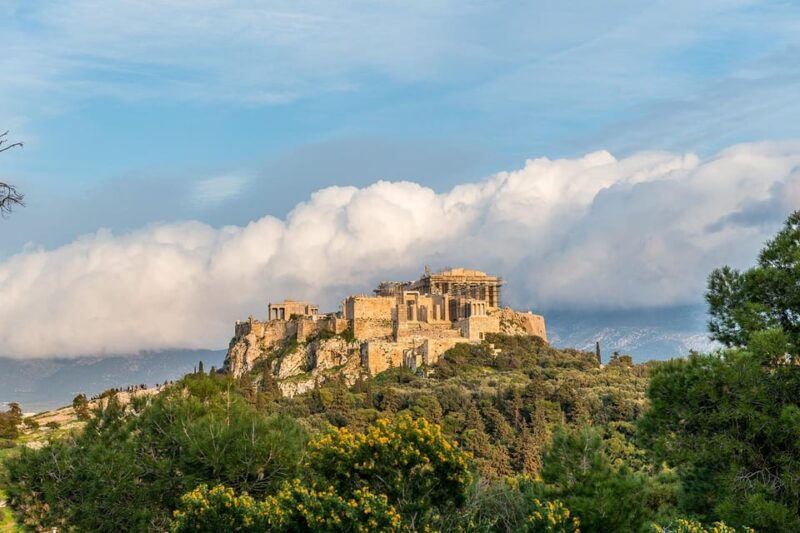
- The Acropolis and Agora were the physical and ideological centers of Athenian democracy, showcasing its architectural marvels and civic engagement.
- Athenian democracy was founded on principles of participation, equality, and rotation of office, though it excluded women, slaves, and foreigners.
- The Acropolis and Agora facilitated the exchange of ideas, debates, and the exercise of democratic principles in ancient Athens.
- Athenian democracy influenced modern political thought and governance, providing a conceptual blueprint for representative government.
- The legacy of Athenian democracy continues to inspire democratic engagement and challenges in governance, despite its historical limitations.
The Birthplace of Democracy
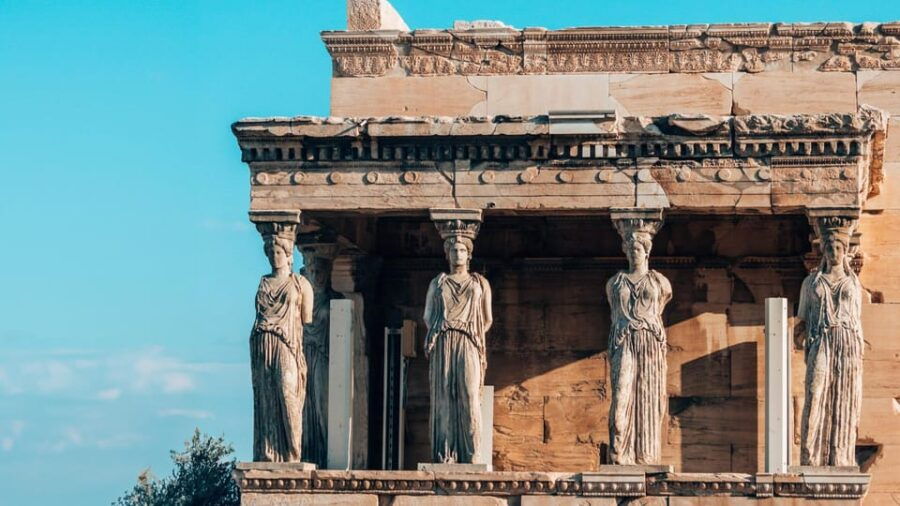
Although ancient Greece is often considered the birthplace of democracy, its origins can be traced back to the city-state of Athens in the 5th century BC.
During this time, the Athenians established a system of popular sovereignty, where citizens directly participated in the decision-making process. This radical political concept, known as "demokratia," challenged the traditional aristocratic rule.
The Athenian model of democracy emphasized principles of equality, civic participation, and majority rule. However, it also faced criticisms, as it excluded non-citizens, including women and slaves, from the political process.
The Athenian democracy emphasized equality and civic participation, but excluded non-citizens, including women and slaves, from political power.
The Athenian democracy ultimately collapsed, but its legacy endures as a foundational influence on modern democratic thought.
Looking for more options in Athens? We've reviewed plenty of other experiences.
Architectural Marvels of the Acropolis
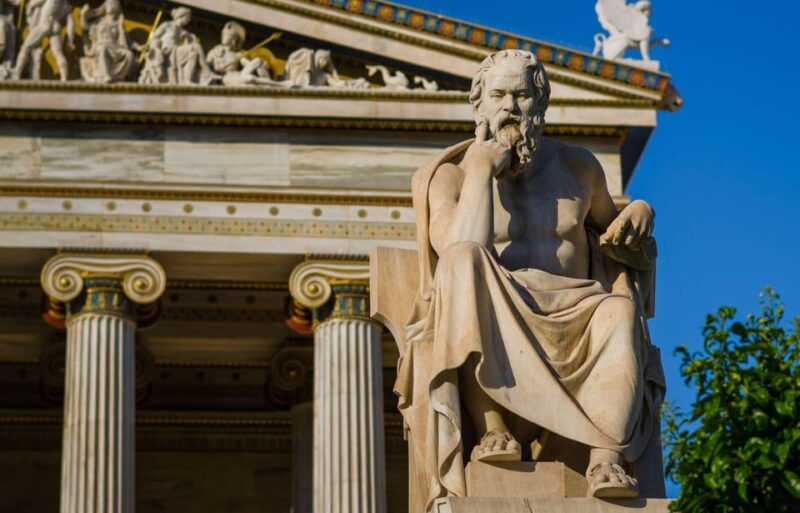
The Acropolis, perched atop a rocky outcrop in the heart of Athens, is a breathtaking testament to the architectural prowess of ancient Greek civilization.
Its most iconic structure, the Parthenon, stands as a masterpiece of classical Greek architecture, featuring:
-
Impressive columns supporting the temple’s pediments and entablature.
-
Elaborate sculptural decorations adorning the temple’s exterior.
-
Intricate and harmonious proportions that exemplify the principles of Greek aesthetic sensibility.
These architectural marvels, along with the Erechtheion, Propylaea, and Temple of Athena Nike, showcase the ancient Athenians’ dedication to creating spaces that embodied their democratic ideals and reverence for their patron goddess, Athena.
Exploring the Ancient Agora
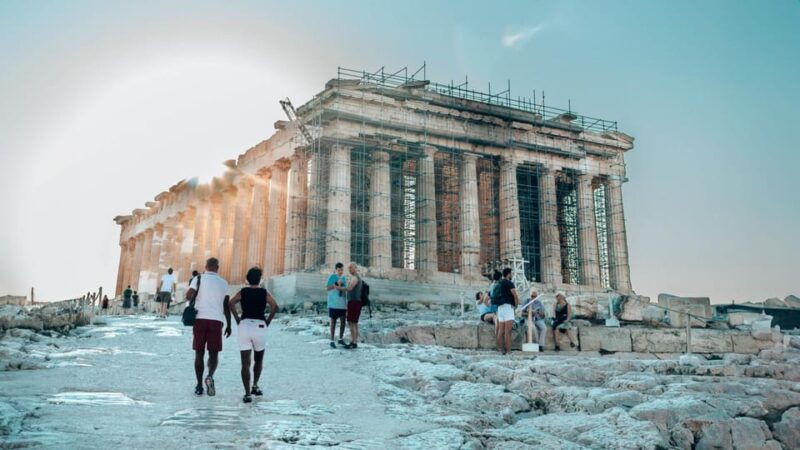
Complementing the architectural marvels of the Acropolis, the Ancient Agora offers a captivating glimpse into the heart of Athenian democracy.
This sprawling marketplace and civic center was the epicenter of political, economic, and social life in ancient Athens. Visitors can explore the well-preserved ruins of the Stoa of Attalos, the Temple of Hephaestus, and the Bouleuterion, where the city’s governing council convened.
The guide’s knowledgeable commentary illuminates how this space fostered the exchange of ideas, debates, and the exercise of democratic principles.
Exploring the Agora provides a visceral connection to the origins of Western democracy.
The Principles of Athenian Democracy
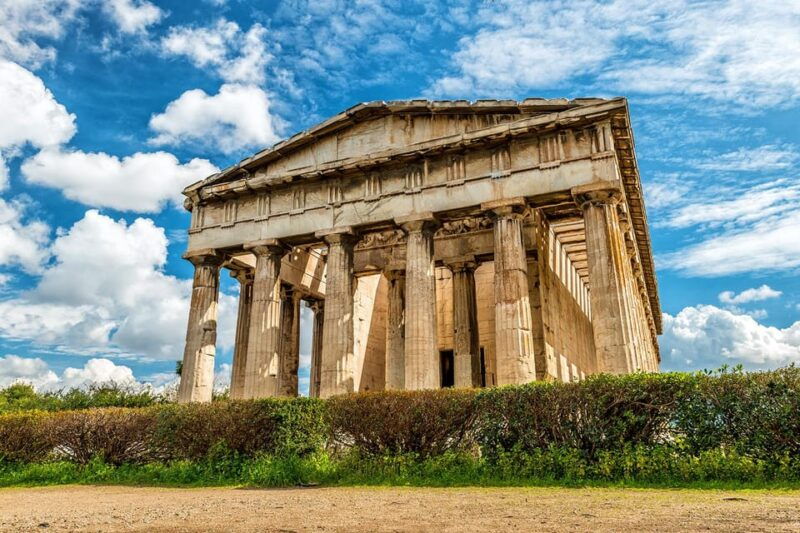
Athenian democracy was a radical political system that challenged traditional forms of governance. It was founded on three key principles:
-
Participation – All male citizens had the right to participate directly in the decision-making process through the Assembly and law courts.
-
Equality – Citizens were viewed as equals under the law, with no hereditary aristocracy or privileges.
-
Rotation of Office – Public offices were rotated, giving all citizens a chance to govern.
However, Athenian democracy had its limitations, as it excluded women, slaves, and foreigners from participation.
Athenian democracy excluded women, slaves, and foreigners from participation, highlighting its limited and exclusionary nature.
Its fragility was ultimately exposed, leading to its eventual downfall.
More Great Tours NearbyThe Paradox of "People-Power"
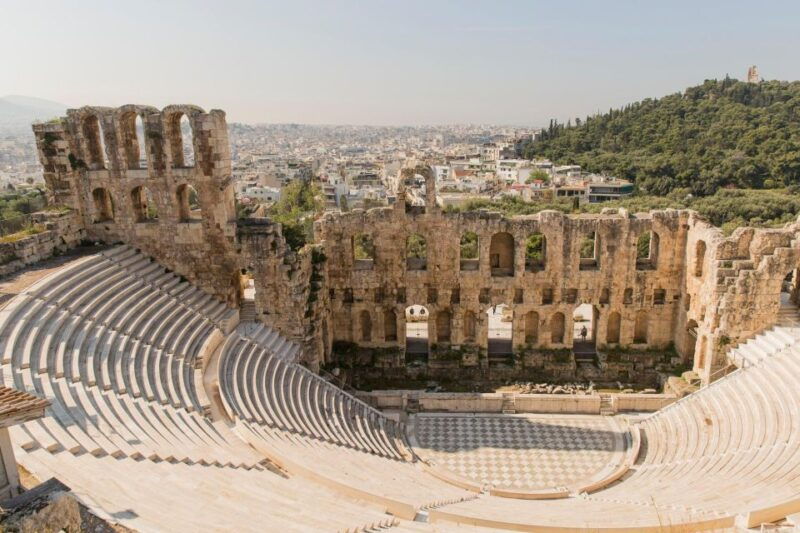
While Athenian democracy pioneered revolutionary principles of participation and equality, it also revealed a critical paradox. The very notion of "people-power" was limited, as only a fraction of the population – free male citizens – were granted voting rights. Women, slaves, and foreigners were excluded from the democratic process, undermining its inclusivity. This exclusion highlights the paradox inherent in Athenian democracy, where self-governance was both groundbreaking and highly restricted. The evolution of democratic values remains an ongoing challenge, as societies grapple with balancing majority rule with minority rights.
| Principles | Limitations |
| — | — |
| Participation | Exclusion of women, slaves, foreigners |
| Equality | Limited to free male citizens |
| Self-governance | Paradox of "people-power" |
- Delphi Oracle Premium Tour With Live Guide and Entrance Tickets
- 4-Day Classical Greece Tour: Epidaurus, Mycenae, Olympia, Delphi, Meteora
- Essential Athens Highlights Plus Cape Sounion Skip-The-Line Tour
- Highlights of Athens Biketour
- Private Biblical Tour of Ancient Corinth & Isthmus Canal
- Small Group, Delicious Athens Food Tour
The Enduring Legacy of Greek Democracy
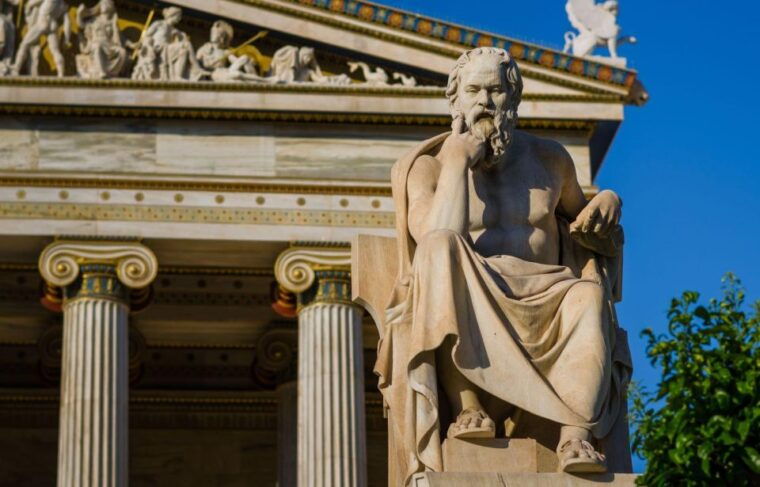
The enduring legacy of Greek democracy is evident in its profound influence on modern political thought and governance. The principles of popular sovereignty, rule of law, and civic participation that defined ancient Athenian democracy have reverberated through the ages.
Three key aspects of this legacy include:
-
Foundational Inspiration: Greek democracy provided the conceptual blueprint for representative government, directly inspiring the democratic models adopted by many modern nations.
-
Constitutional Design: The Athenian constitution and its separation of powers continue to shape contemporary approaches to drafting governing charters.
-
Civic Ideals: The Greek emphasis on active citizenship and public discourse remains a guiding force for strengthening democratic engagement.
Witnessing the Ruins and Reflecting on the Past
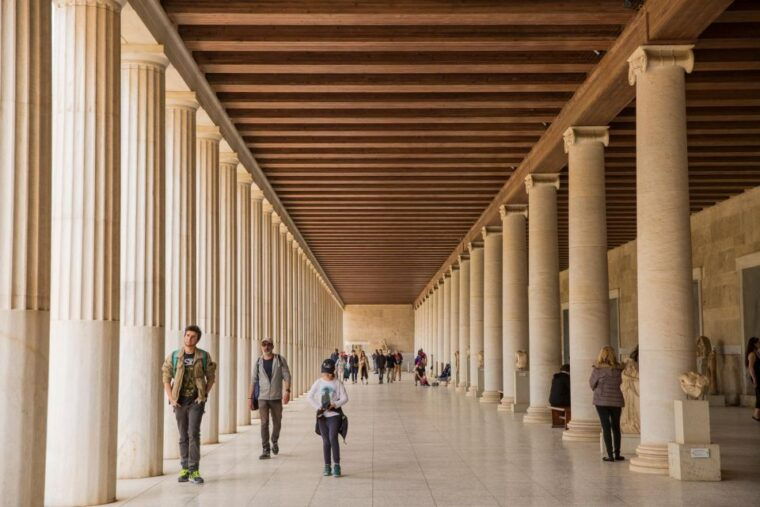
Standing before the iconic ruins of the Acropolis and the Ancient Agora, visitors embark on a profound journey of historical reflection.
They witness firsthand the physical remnants of Athens’ democratic experiment, contemplating its triumphs and tribulations. The tour provides valuable context, delving into the principles, values, and challenges that defined this radical political system.
Amidst the weathered stones, travelers gain a deeper appreciation for the fragility and resilience of democracy, grappling with its complex legacy.
Amidst the weathered stones, travelers gain a deeper appreciation for the fragility and resilience of democracy, grappling with its complex legacy.
This immersive experience transcends the typical sightseeing, inviting a thoughtful exploration of the past and its enduring influence on the present.
Taking in the Historical Significance
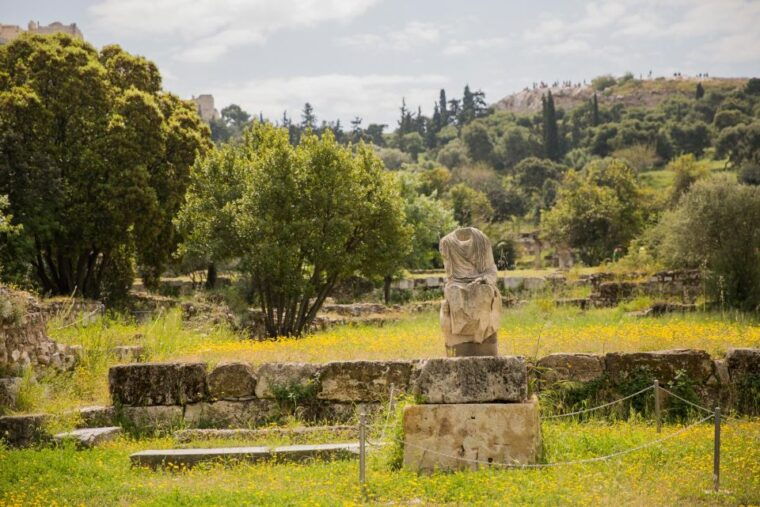
As visitors explore the ancient ruins, they enjoy the historical significance that permeates the very stones of the Acropolis and Ancient Agora.
Through guided tours, they gain insights into:
-
The cornerstones of Athenian democracy, such as the power of the people, freedom of speech, and civic participation.
-
The evolution of democratic principles and their influence on modern political systems.
-
The inherent challenges and flaws of ancient democracy, providing a thought-provoking lens on the complexities of governing.
This immersive experience allows travelers to connect with the past and contemplate the lasting impact of these groundbreaking ideas.
Since You Asked
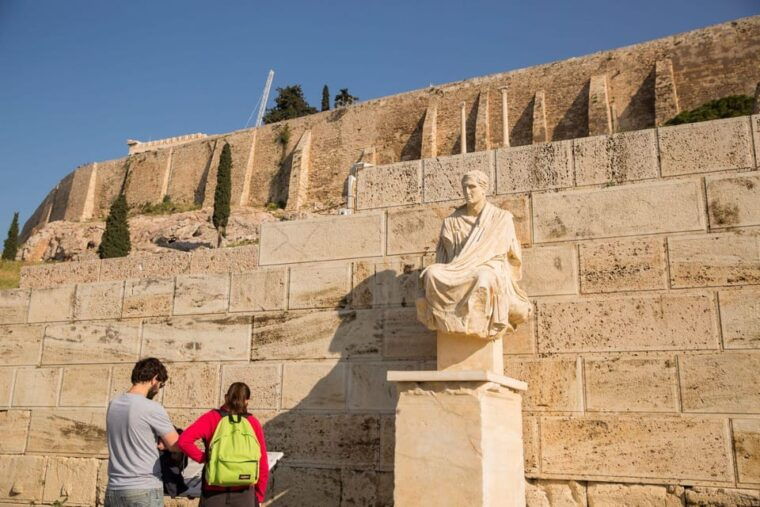
Is the Tour Accessible for Wheelchair Users?
The tour is not accessible for wheelchair users, as the description states it is "not suitable for wheelchair users". Visitors with mobility issues may need to consider alternative tour options in Athens.
Can I Bring My Backpack on the Tour?
No, backpacks are not allowed on the tour. The tour information states that restrictions include "no baby strollers, pets (except assistance dogs), backpacks." Participants are advised to bring only what they can comfortably carry.
What Is the Minimum Age Requirement for the Tour?
The minimum age requirement for the tour is 8 years old. The tour is not suitable for children under 8 as stated in the participant information. Visitors should keep this age restriction in mind when booking the tour.
Do the Guides Speak Any Other Languages Besides English and French?
The tour guides speak English and French, but the website doesn’t specify if they offer any other language options. Participants should inquire about additional language support when making their booking.
Is It Possible to Get a Full Refund if I Cancel the Tour?
Yes, the tour offers full refunds if you cancel up to 24 hours in advance. This provides flexibility in case your plans change, allowing you to book the tour without worrying about nonrefundable payments.
Final Words
The Acropolis and the Agora of Athens stand as reminders of the complexities in the evolution of democratic ideals. While these sites symbolize the architectural and cultural brilliance of ancient Greece, they also highlight the inherent limitations of a system that excluded women, slaves, and foreigners. The enduring legacy of Greek democracy serves as a thought-provoking lesson on the challenges of realizing true equality and civic participation.
You can check availability for your dates here:More Walking Tours in Athens
- Private Athens: Hidden Gems Guided Walking Tour
- Acropolis: Acropolis and Parthenon Guided Walking Tour
- Athens by Night: Small-Group Walking Tour | Dinner Included
- Athens: Private Walking Tour with a Local
- Athens: Acropolis & Parthenon Walking Tour with Local Guide
- Athens: Classic Street Food Walking tour with 6 Tastings
More Tours in Athens
- Ancient Athens Segway Tour
- Athens: Food Tour with Tastings & visit to Varvakios market
- 3-Day Delphi & Meteora Tour with 4 star hotels and tickets
- Athens: Ancient and Modern Highlights Private Guided Tour
- Athens: The city streets and great eats private tour
- Athens: Brunch Buzz Street Food Tour with a Local
More Tour Reviews in Athens
Still browsing? Here are more Athens experiences we've covered recently
- 5 Best Hiking And Trekking Tours In Athens (With Prices)
- The Top 3 Spa & Hot Springs Experiences In Athens
- 14 Best Wine Tours In Athens (With Prices)
- We Rank Athens’s 3 Top Drinking Tours
- 13 Best Workshops & Classes In Athens (With Reviews & Prices)
- 12 Top-Rated Athens Lunch Experiences
- 12 Best Walking Tours In Athens
- The 4 Best Snorkeling Experiences In Athens
- What Are The Best Tours In Athens? Our Top 14 Picks
- Athens’s 13 Best Food Tours: Which To Choose?
- Our Picks For The 7 Best Shopping & Market Tours In Athens
- The 4 Most Popular Massage & Relaxation Services In Athens
